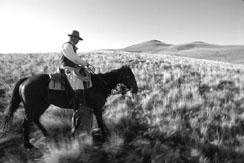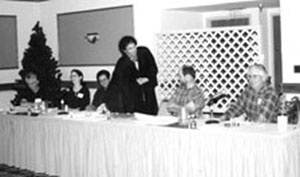 |
||||||||
 |
2003 Calendars Available Now! Click here to order! |
|||||||
| Subscriptions click here for 20% off! E-Mail: info@rangemagazine.com |
||||||||
|
|
||||||||
Whereas, the new century offers us the opportunity to rectify the mistakes
of the last, to recover what has been lost, and to restore what
has been damaged; WHEREAS, the American public prizes its wild, diverse and vast
public lands as a common treasure; WHEREAS, for decades, awareness of the complexity, vulnerability
and ongoing loss of wild ecosystems on our continent has been
growing; WHEREAS, there is also increasing recognition of the power of
natural systems to recover much of their original diversity and
vigor when destructive activities cease; WHEREAS, virtually all western public lands are grazed by domestic
livestock; WHEREAS, domestic livestock grazing is the single most pervasive
and damaging activity on western public lands; WHEREAS, domestic livestock grazing on public lands (hereinafter
referred to as public lands grazing) has severely damaged western
seeps, springs, creeks, rivers and lakes, the organisms in them
and the vegetation around them; WHEREAS, public lands grazing has caused massive losses of western
soils; WHEREAS, public lands grazing promotes the replacement of native
plants by invasive exotics and noxious weeds; WHEREAS, public lands grazing is the single greatest contributor
to the loss of biodiversity and the imperilment of threatened
and endangered species in the West; WHEREAS, domestic livestock on public lands directly compete with
wildlife, which is of far greater ecological, aesthetic and economic
value than domestic livestock; WHEREAS, public lands grazing involves the killing, at taxpayer
expense, of large numbers of wild animals every year, such as
prairie dogs, coyotes, wolves, mountain lions, bears and bison,
disrupting ecologically crucial predator/prey relations; WHEREAS, the Bureau of Land Management, the U.S. Forest Service,
the National Park Service and the U.S. Fish & Wildlife Service
too often mismanage public lands to serve the livestock industry; WHEREAS, there are more and more examples of the recovery of natural
systems on lands where domestic livestock have been removed; WHEREAS, the continuance of public lands grazing requires massive
subsidies from American taxpayers, who thereby finance the degradation
or destruction of their own public lands; WHEREAS, public lands grazing contributes very little to the American
economy or food supply, but involves heavy ecological costs; WHEREAS, the existence of the public lands grazing industry delays
the necessary transition to a healthy, sustainable economy in
the American West; NOW, THEREFORE, BE IT RESOLVED that we, the participants in the
RangeNet 2000 Symposium, call for a prompt end to public lands
grazing. BE IT FURTHER RESOLVED that we view the cessation of public lands
grazing as an essential first step in the restoration and re-wilding
of our magnificent heritage of western public lands. To implement this declaration, we agree to: . Response to RangeNet...by Ed Depaoli
And they really are serious.
The “RangeNet 2000 Declaration”...
Wherein environmental activists wage another war on western resource
users. First it was timber, now it’s grazing.
Who’s next?

“...domestic livestock grazing is the single most pervasive and damaging activity on western public lands.”
RangeNet 2000 Declaration
Buckaroo looks for cattle on public lands in Northern Nevada.
Catle have grazed here for more than 76 years. Lightning in the
early ’90s burned brush and left abundant native grass.
© C.J. Hadley
(a) launch a national campaign to end public lands grazing;
(b) form an organization to coordinate this campaign;
(c) organize a follow-up 2001 grazing conference to further the
campaign;
(d) support our member groups in their separate efforts to end
public lands grazing.
Adopted this 29th day of November 2000 in Reno, Nevada.

National Wildlife Federation lawyer Tom Lustig dresses in judge’s
robes to make a point. With him are, from left: Martin Taylor,
Center for Biological Diversity; Stephanie Parent, Oregon Natural
Desert Assn.; Bill Eddie, Land & Water Fund of the Rockies; John
Horning, Forest Guardians; and Jon Marvel, Idaho Watersheds Project.
Related story links:
|
To Subscribe: Please click here or call 1-800-RANGE-4-U for a special web price Copyright © 1998-2001 RANGE magazine For problems or questions regarding this site, please contact langier@volcano.net or cj@rangemagazine.com last page update: 2.24.01 |